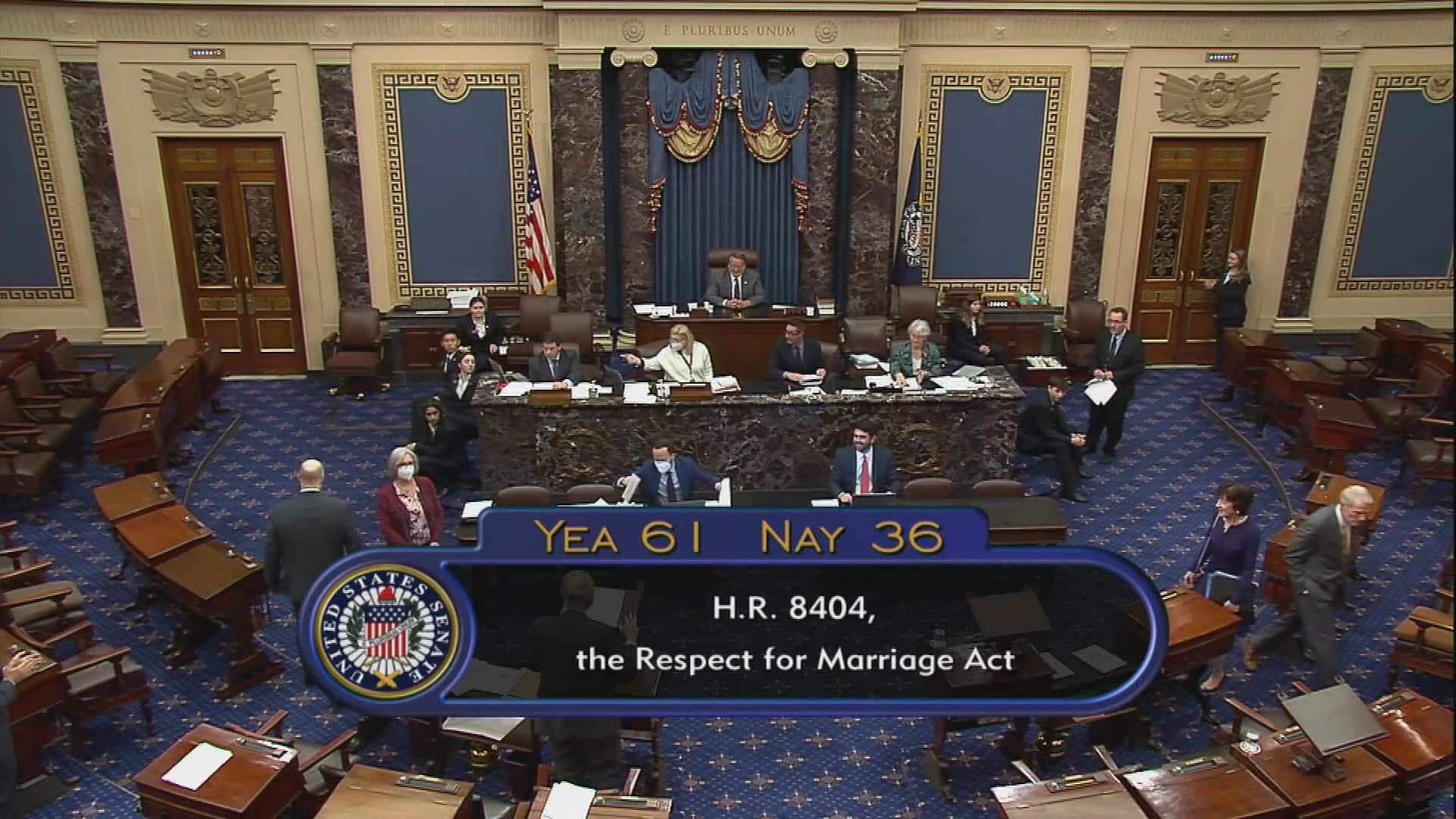
Democrats have precious little time left in power in the U.S. Congress, with barely a month until they’re relegated to opposition in the House of Representatives.
They’re now racing to complete parts of their agenda.
Their to-do list for the so-called lame-duck session includes same-sex marriage, Ukraine funding, election reform, immigration, a child benefit, must-pass budget bills and averting a government shutdown.
The sudden rush is fuelled by the fear that, for some of these items, it’s now or never, given that Republicans start controlling the House on Jan. 3.
After that, it’s the end of an era: top Democrats like Nancy Pelosi and Steny Hoyer will leave their leadership posts, and it could be years before the next generation of party leaders takes power.
“We’ve got a lot to do this year,” Hoyer, the No. 2 House Democrat, told reporters in an office chat Tuesday. “This year, [meaning] the next three weeks [before the holidays].”
Some items on that list — same-sex marriage, electoral reform and Ukraine funding — have strong chances of passing. That’s because those bills have the secret ingredient some others lack: enough Republican votes to clear the Senate threshold of 60 per cent.
Others are on shakier ground.
Same-sex marriage: May be law within days
A beaming Democratic leader pointed to the purple tie he was wearing Tuesday; Chuck Schumer said it was the same one he wore the day his daughter married her wife, and he was wearing it again as the Senate advanced a same-sex marriage bill.
“What a great day,” Schumer said.
The Senate passed the bill in a 61-36 vote on Tuesday, as 12 Republicans sided with the majority and helped clinch the chamber’s necessary 60 votes.
WATCH | Senate passes bill to protect same-sex, interracial marriages:
U.S. Senate Majority Leader Chuck Schumer called it ‘a great day’ after a vote passed on a bill that would require every state to recognize a marriage performed in another state, regardless of sex or race.
House leaders intend to take up the bill next week, pass it quickly, and hand it over to President Joe Biden so he can sign it into law.
Most Republicans derided the bill as a pointless measure, given that a Supreme Court decision legalized same-sex marriage seven years ago. “This is based on, frankly, a scare tactic,” Republican Sen. John Cornyn said.
But bill proponents call it a badly needed backstop, should today’s more-conservative Supreme Court ever reverse that 5-4 decision from 2015. It would provide a fail-safe should the court ever do to same-sex marriage what it did to abortion, they say — an idea already raised by Justice Clarence Thomas.
This bill would require every state to recognize a marriage between two individuals — of any sex or race — performed in another state.
The House originally passed the bill over the summer but will have to do it again to incorporate an amendment sought by Senate Republicans, guaranteeing religious freedom.
Likely wins: Ukraine, election reform
Ukraine had reason to be worried about the midterm election outcome, as many Republicans want to cut off the American cash funding its defence.
The likely next House speaker, Kevin McCarthy, won’t confirm if he’d allow Ukraine funding bills to pass. He has said he won’t allow any more “blank” cheques, and wants accountability and audits tied to any future funding.
The Biden White House wants to lock up future funding now. It has requested nearly $40 billion US for Ukraine, both for military and non-military purposes, for weapons, intelligence assistance, food and energy.
Senate Republicans are signalling a willingness to help Democrats here.
“I’m a robust supporter of Ukraine,” Republican Senate Leader Mitch McConnell said recently. “We need to get them what they need to continue to fight this war. I think they have the capacity to win it.”

Election bill seeks to avoid another Jan. 6
There’s a bill to avoid future crises like the one on Jan. 6, 2021, when a mob smashed its way into the Capitol to block the presidential election certification.
The bill clarifies that reporting election results falls under the authority of a state’s governor — not any rogue lawmakers. It also makes it harder for any member of Congress to delay certification other than under the existing law, which dates back to 1887.
It would require one-fifth of lawmakers to support an objection, above the current one politician from each chamber.
The issue was driven home again in this year’s midterms: numerous election deniers ran, and lost, and some refused to accept the results; counties in Pennsylvania and Arizona even tried withholding certification.
Numerous Republicans support the bill. One predicted it will pass soon.
“It’s time now to have a vote. And I believe we’ll get that done before the end of the year,” Roy Blunt, the retiring senator from Missouri, told a panel discussion hosted this week by the congressional outlet Punchbowl News.
To save time on the Senate floor, some expect the bill might be tacked onto larger legislation, like the annual Pentagon funding legislation.
Seeking budgetary stability
As they look to nail down legacy items, Democrats will also be dealing with procedural emergencies over the next few weeks.
That begins with the scramble to avert a government shutdown in late December, which will happen unless Congress passes a funding bill. If lawmakers can’t approve a normal budget through laborious processes involving a dozen committees, they might have to settle for an extension of existing funding.
That measure is known as a continuing resolution, and Hoyer described it as: “Very clumsy, very inefficient.”
The U.S. military is pleading with congressional leaders to do better than that. It wants a real budget, which would allow it to fund new programs in the Indo-Pacific region and elsewhere.
“We must break this pattern of extensive inaction,” Defence Secretary Lloyd Austin wrote to congressional leaders.
“We can’t outcompete China with our hands tied behind our back three, four, five or six months of every fiscal year.”
In their ideal world, Democrats would also extend the debt ceiling to avoid guaranteed headaches next year. The U.S. risks a credit default — a potential economic catastrophe — unless lawmakers approve additional debt levels.
Republicans have made clear they intend to use that debt process as leverage in a negotiation: They’ll approve a debt extension, if Democrats agree to cut spending on some of their priorities.
Schumer told reporters earlier this month that he’d like to “get a debt ceiling done in this work period,” but conceded he needs Republican votes to make it happen in the Senate.
Several Republican senators have expressed criticism about the prospect. McConnell previously avoided answering a question about the 2023 debt limit debate, saying: “We haven’t even finished 2022 yet.”
That likely means a U.S. debt standoff next year, with the entire global economy watching.
Unfinished business: Immigration, family policy
The Democrats tried — and failed — to pass paid parental leave, universal pre-K, and failed to entrench a Canadian-style child benefit that American parents received during the pandemic.
Hoyer told reporters Tuesday he’s still trying to get a child benefit passed.
Another disappointment: Immigration policy.
Millions of undocumented people remain in limbo, including about 830,000 people who grew up in the U.S. after arriving as children, without papers. Courts have already signalled an interest in striking down a presidential program created to let them study and work without fear of deportation, known as DACA.
Cinthia Padilla, now a lawyer, was just one when her mother took her on foot into the U.S. from Mexico.
The former assistant district attorney in New Orleans has seen hope repeatedly ebb and flow that her status might be normalized in legislation. As it stands, she can’t leave the U.S., including travel for work, and lives under the constant threat of deportation.

“It almost feels like a déjà vu moment,” Padilla said in an interview Tuesday. “A lot of us are learning to live a day at a time.… We’re like a bird, with broken wings.”
Democrats say they want to pass a bill to protect those so-called “DREAMers,” like Padilla, and are pleading for a few Senate Republicans to help.
“We need 10 Republican senators,” Dick Durbin, a senior Democrat, said in the Senate this week. “Just 10.”
Durbin said he’s actually had encouraging conversations with some Republicans, noting they understand the need to act quickly. But he wouldn’t name them.
Amid a spike in irregular migration that has angered conservatives, some Republicans say there’s no way they’ll touch anything that sounds like amnesty. They include previous moderates on immigration.
Last week, Florida Sen. Marco Rubio called it “crazy” to think a deal might happen now, and Sen. Lindsey Graham, of South Carolina, said there won’t be any Republican votes to do this until the border is secure.
